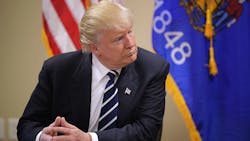President Donald Trump ordered on Friday a comprehensive study to identify every form of “trade abuse” that contributes to U.S. deficits with foreign countries.
“The theft of American prosperity will end,” Trump said at an Oval Office ceremony announcing the study, along with another directive to step up enforcement of existing trade penalties. “Thousands of factories have been stolen from our country, but these voiceless Americans now have a voice in the White House.”
Trump announced the trade initiatives less than a week before his first meeting with Chinese President Xi Jinping, leader of the country Trump has blamed most frequently for trade deficits and job losses. Commerce Secretary Wilbur Ross, who briefed reporters in advance, said the two executive actions weren’t intended as a warning to China.
The trade study, to be completed within 90 days, will examine deficits “country by country and product by product” to assess the extent they are caused by “cheating or inappropriate behavior,” Ross said. He said the findings, which also will cover currency misalignments, disadvantageous provisions in trade deals and "constraints" imposed by the World Trade Organization, will help guide Trump’s trade policies.
Tighter Grip
Trump also ordered strengthened enforcement of existing countervailing duties and anti-dumping penalties against foreign products to address under-collection, said Peter Navarro, director of the White House National Trade Council. Anti-dumping penalties target exporters that sell goods below the cost of production and countervailing duties are intended to compensate for foreign-government subsidies to producers.
Navarro said such duties have been under-collected by a cumulative $2.8 billion since 2001. Last year, the nation collected $1.5 billion in the penalties, he said.
Representative Rosa DeLauro, a longtime critic of U.S. free-trade deals, mocked Trump’s directives as underwhelming.
“Working and middle class Americans deserve real actions to level the playing field with fair trade, DeLauro, a Connecticut Democrat, said in an emailed statement. “While initiating a new a federal report is a common way to avoid fixing problems, the real test will be whether the Administration takes action to create jobs and reduce the trade deficit. ”
Trump made addressing what he called unfair foreign trade practices a centerpiece of his presidential campaign. At the Oval Office ceremony on Friday, he said public discontent over trade is “probably one of the main reasons I’m here today.”
One of Trump’s first acts as president was to withdraw from the Trans-Pacific Partnership trade deal his predecessor negotiated. Yet key promises, such as renegotiating the North American Free Trade Agreement, imposing border taxes on companies that move production overseas and labeling China a currency manipulator, remained unfulfilled.
Trump sent out a tweet Thursday evening suggesting he remains irritated with China over trade.
“The meeting next week with China will be a very difficult one in that we can no longer have massive trade deficits and job losses,” Trump said via his Twitter account. “American companies must be prepared to look at other alternatives.”
Ross echoed that criticism in an interview Friday with Bloomberg Television.
‘Most Protectionist’
“My view is that the United States is about the least protectionist of the major countries--and that China is one of the most protectionist,” Ross said. “There’s an inherent clash between those two, even though China uses a tremendous amount of free-trade rhetoric.
China is the biggest U.S. trade partner, as well as the nation running up the biggest deficit in trade of goods--$347 billion in 2016, almost half of the U.S. total. But China also is among the top three export markets for 33 states.
At a White House briefing for reporters previewing Friday’s actions that began barely 15 minutes after Trump’s tweets on China, Navarro dismissed questions about whether the orders should be read as a warning to the nation.
“Nothing we’re saying tonight is about China,” Navarro said at a Thursday evening briefing. “Let’s not make this a story about China. This is a story about trade abuses.”
Navarro said the administration will seek better collection of duties imposed as trade penalties by directing the secretary of Homeland Security to work with the U.S. Trade Representative and Commerce Department to impose bonding requirements and take other legal actions based on risk assessments.
Another goal is to step up the seizure of counterfeit and pirated goods, Navarro said.
The White House on Thursday also distanced itself from a document suggesting it was softening its goals for a renegotiation of Nafta.
A letter sent to key members of Congress as part of a consultation process required before triggering a renegotiation suggested the administration would seek more modest changes and would leave in place controversial pieces of the trade deal, including an arbitration panel that lets investors bypass the court system to redress claims under the pact.
White House press secretary Sean Spicer said Thursday that the letter “is not an accurate statement of where we are at this time.”
About the Author
Bloomberg
Licensed content from Bloomberg, copyright 2016.
